Alabama AG Steve Marshall to review if Senate race tactics violated law
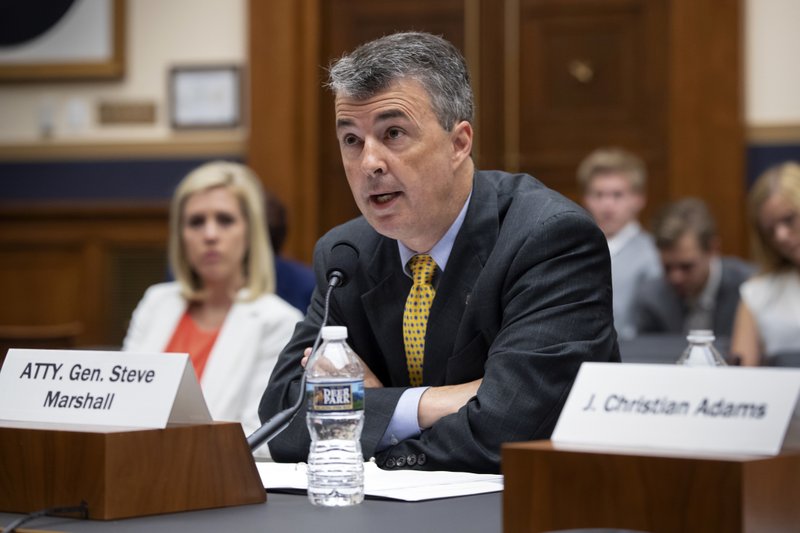
Alabama’s attorney general said Thursday that his office is reviewing whether allegedly deceptive social media tactics used in last year’s U.S. Senate race might have violated the law. Attorney General Steve Marshall told The Washington Post that reports about the effort are concerning. He said he wants to explore the issue, but stopped short of saying that his office is opening a formal investigation. “The impact it had on the election is something that’s significant for us to explore, and we’ll go from there,” Marshall, a Republican, told the newspaper. The Washington Post and New York Times reported that a social media researcher acknowledged testing misleading online tactics during Sen. Doug Jones’ 2017 campaign against Republican Roy Moore. The newspapers said operators posed as conservative voters on a Facebook page and that Twitter accounts were used to make it appear that Russian bots were following Moore. Rich Hobson, who was Moore’s campaign manager in the 2017 race, said the campaign reported concerns to social media platforms last year. “We suspected that someone or some group was interfering and we complained to Facebook as early as June 2017,” Hobson told The Associated Press on Thursday. It is unclear how far the effort reached. Some news outlets reported last year about Moore’s campaign receiving a swell in Twitter followers with Russian names. The Moore campaign said at the time it had reported the matter to Twitter, and suggested political opponents were behind the matter and were trying to plant a negative story with media members. Hobson said he could not recall the name of a Facebook page that raised concern. The newspapers reported that Jonathon Morgan, chief executive of Texas-based research firm New Knowledge, acknowledged being paid by American Engagement Technologies to experiment on a small scale. Morgan in a statement last week said his involvement was as a researcher with “the intention to better understand and report on the tactics and effects of social media disinformation.” “I did not participate in any campaign to influence the public and any characterization to the contrary misrepresents the research goals, methods and outcomes of the project,” Morgan said in a statement. The reports drew condemnation on both sides of the political aisle in Alabama, where Jones recently marked a year since becoming the first Democrat elected to the U.S. Senate from the state in a quarter-century. Jones called for an investigation into the matter. He told reporters last week that his campaign didn’t know anything about the effort at the time. And Jones says he is “as outraged as everyone else” about the allegations. Alabama Republican Party Chairwoman Terry Lathan called the revelation “deeply disturbing.” Internet entrepreneur Reid Hoffman this week apologized for donations he made that he said unknowingly helped fund the effort. “I categorically disavow the use of misinformation to sway an election,” Hoffman wrote. Alabama Secretary of State John Merrill said Thursday that there were multiple concerns raised during the 2017 race about misleading social media tactics. Merrill said it is clear that there needs to be “more policing done by the social media platform executives.” Republished with permission from the Associated Press.
Jeff Sessions: ‘I don’t follow tweets as closely as I used to’
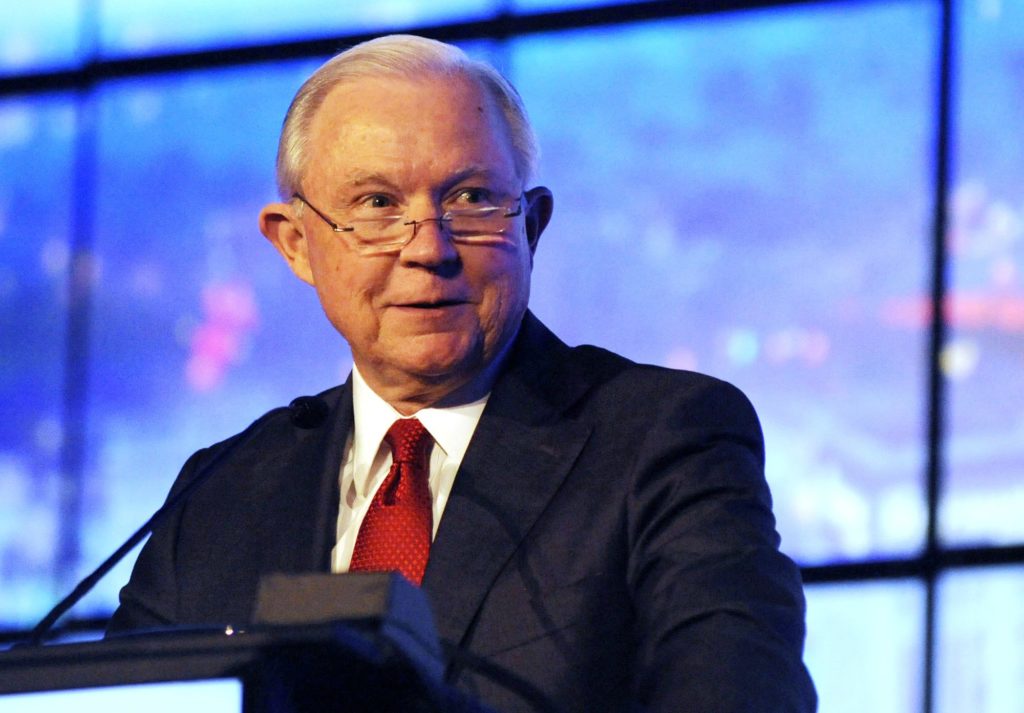
Former Attorney General Jeff Sessions lavished praise on what he called President Donald Trump’s policy accomplishments Tuesday but added that he’s backing away from his former boss’s favorite social media platform. Listing achievements that he said included improving the economy, fighting crime and supporting police officers, Sessions said he was proud of his time running the Justice Department. But more than a month after he was forced out of his job as the nation’s top law enforcement official after a tumultuous tenure in which he was repeatedly maligned by Trump, Sessions said he was “attempting to chill out a bit.” “You can be sure I don’t follow tweets as closely as I used to,” Sessions said to laughter and applause. Sessions, a former U.S. attorney and Alabama state attorney general, said he knew running the Justice Department involved making decisions that could create controversy. “This very public adventure, I’ve got to say, exceeded my expectations,” Sessions said. He infuriated Trump by recusing himself from the Justice Department’s investigation of alleged Russian meddling on behalf of Trump in the 2016 election. But at times Sessions sounded like he was still part of Trump’s team, repeatedly using the word “we” to describe things going on in Washington. He once invoked Trump’s campaign slogan, “Make America Great Again.” The former U.S. senator didn’t say whether he might try to regain the seat now held by Alabama Democratic Sen. Doug Jones. Republished with permission from the Associated Press.
Daniel Sutter: Is Facebook really like Ma Bell?

Some commentators and politicians have proposed regulating Facebook, Twitter, and Google as public utilities. To make sense of this proposal, let’s consider the economic role of public utilities. Today’s social media giants might meet the popular definition of monopoly, namely having a very large market share. Economists, however, use a much stricter definition, and public utility regulation is applied only to the specific type known as a “natural” monopoly. Natural monopoly refers to industries where the cost per unit produced or customer served falls due to a very high first unit cost and a very low cost of serving extra customers. Consider the electric grid. Establishing the grid requires generation plants, transmission lines, substations, and finally the power wires in our communities. Once built, the cost of connecting one more home or business to the grid is very low. The same dynamic applies to water and sewer systems, landline telephones, and roads and streets. One large firm will likely dominate such industries. Why? Competition drives price down to the cost of production. Here the largest firm has a cost advantage and can profitably charge lower prices than its rivals. Smaller firms can either match the leader’s price and lose money or maintain a profitable price and likely lose customers. After the smaller guys go bankrupt, the large firm can raise its price and earn big profits. We frequently use anti-trust laws to prevent the establishment of or to break up existing monopolies. But breaking up a natural monopoly is unlikely to produce competition for long. The largest firm’s cost advantage doesn’t go away. What are the alternatives? One is government ownership of the utility, which we rely on for water, sewers, roads, and electricity in communities like Troy. Cooperative ownership by customers – electric and natural gas co-ops – prevents managers from trying to profit at customers’ expense. Public utilities regulation gives a private, for-profit company an exclusive service territory, albeit with restrictions. Government regulators, in Alabama the Public Service Commission, set prices and other terms of service. And the utility is a common carrier who must provide service to all customers willing to pay the regulated price. Economists and lawyers developed the public utilities doctrine around 1900. Another way to think about a public utility is that competition between profit-seeking businesses normally best serves customers. But the enormous cost of power grids renders multiple systems and competition unattractive. Perhaps having one grid and economists deliver the benefits of competition through rules makes more sense. Whether the public utilities doctrine served America well during the 20th Century is a question for another day. How about applying this model to social media today? Facebook and Google meet the popular definition of monopoly – they dominate their markets. Twitter dominates its unique product, but alternatives exist to push out messages. None of the three has a massive, critical physical infrastructure creating declining cost per customer. The social media giants do possess an advantage resembling natural monopoly. They have coordination value: the value of being on Facebook increases with the number of other users. Economists call this a network effect. Although many economists fear that network effects might lock us into inferior technology, in practice entrepreneurs can get consumers to switch: we do not still watch VHS movies and listen to cassettes. The social media companies serve their customers very well. For instance, YouTube’s advertising allows performers to earn money, with some stars earning millions per year. Facebook has offered users innovative features and an easy interface. Market domination due to better service benefits consumers. Alternatives to Facebook currently exist, like LinkedIn and even MySpace. More significantly, a new rival would not have to duplicate a massively costly physical infrastructure. The economic case for regulating the fast-changing digital world with a model designed for the physical world is weak. Today’s social media giants will likely have a much shorter time on our economic stage than phone and electric utilities unless we cement their positions via regulation. ••• Daniel Sutter is the Charles G. Koch Professor of Economics with the Manuel H. Johnson Center for Political Economy at Troy University and host of Econversations on TrojanVision. The opinions expressed in this column are the author’s and do not necessarily reflect the views of Troy University.
US attorneys general discuss social media privacy concerns
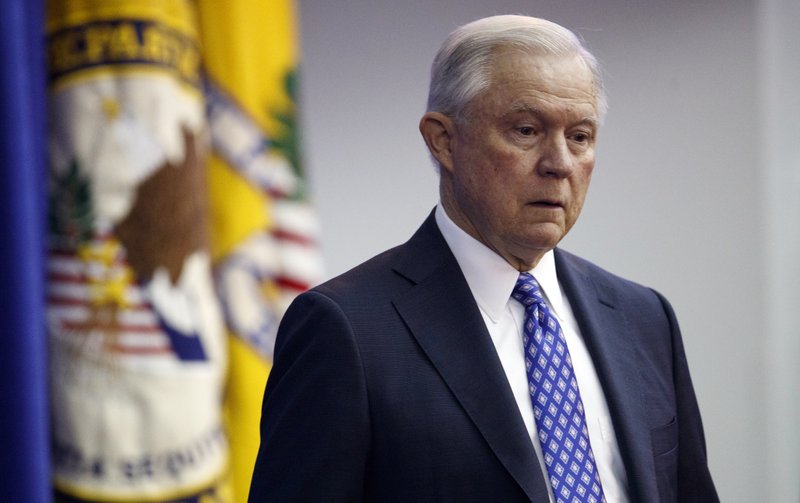
A meeting between top state law enforcement officials and Attorney General Jeff Sessions about how the government can safeguard the privacy of social media users ended Tuesday without a decision on whether to investigate. The gathering at the Justice Department was scheduled to discuss whether tech giants are “stifling the free exchange of ideas” and examine whether they “may be hurting competition.” But California Attorney General Xavier Becerra, a Democrat, says the one-hour meeting mainly focused on consumer protection and data privacy issues. Attorneys general from Alabama, California, Louisiana, Maryland, Mississippi, Nebraska, Tennessee, Utah and Washington, D.C., attended. Five other states sent senior deputies. Justice Department officials said the meeting “centered on ways the Department and state governments can most effectively safeguard consumers using online digital platforms.” Although there wasn’t an immediate decision on whether to open an investigation, the attorneys general discussed the nuances and interpretation of privacy and what might constitute a monopoly in the tech sector, Becerra said. “The conversation really zeroed in on privacy,” he said after the meeting. “I think everyone sees the growth of the industry as something that has become of interest to regulators and enforcers. How it might apply, that is still the open question.” The Justice Department said it will review the “insight” shared by the attorneys general and expects conversations on the topic to continue. Republished with permission from the Associated Press.
Using common social media tactics to subvert US elections
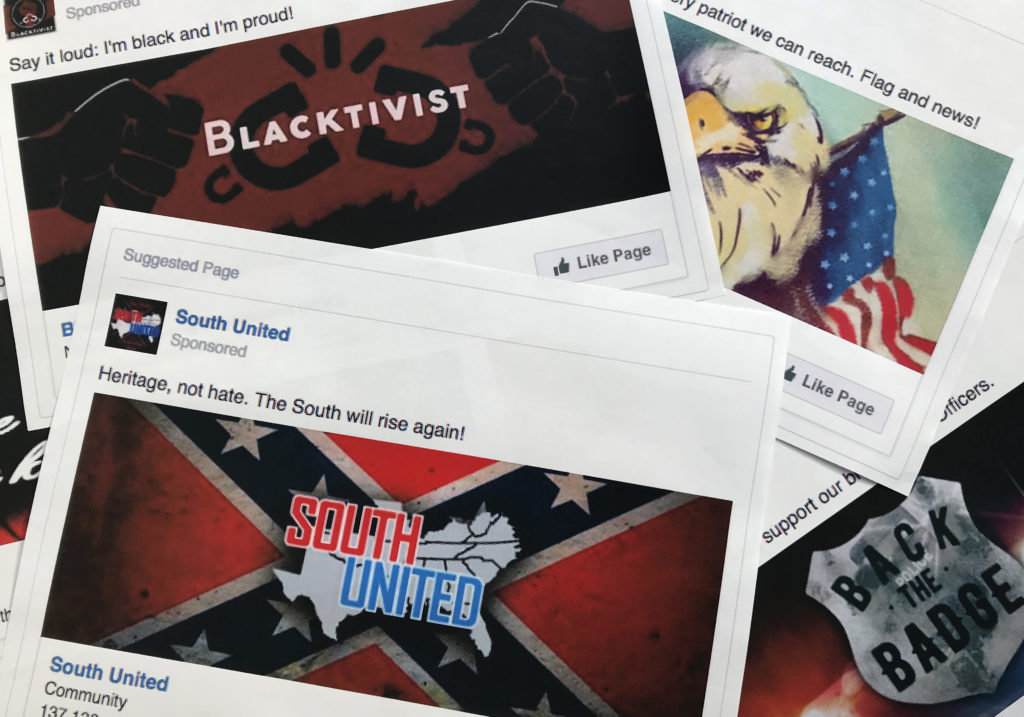
The latest efforts to disrupt the U.S. midterm elections through Facebook manipulation seem to be following a persuasion playbook refined by legitimate companies and organizations — but with a twist. The aim of these possibly Russia-linked perpetrators appears to be to draw in as many people as possible with emotional appeals and then spur them to action. In this case, though, the action is public protest rather than affinity marketing, and the goal is to sow dissension rather than to build brand awareness. “They’re almost functioning like social media editors, figuring out what the trending topics are in the U.S. and figuring out where they can insert themselves,” said Jennifer Grygiel, a communications professor at Syracuse University. The idea, experts say, is to widen the rifts in the U.S. population via propaganda that is less about winning hearts and minds and much more about setting Americans against one another. The removed pages share “moralistic language” and appeal to emotions, said Jay Van Bavel, a New York University psychology professor who studies group identity. “The conflict already existed but they’re stirring it up, picking at a scab.” David Stewart, a marketing and business law professor at Loyola Marymount University, said those behind the scheme are trying to create an “us versus them” mentality, without which Facebook users might not be so polarized. Groups tied to the Russian government have been trying to meddle in U.S. politics since at least the 2016 elections. In February, the Justice Department charged 13 Russians and three companies with plotting to aid Donald Trump‘s presidential campaign through fake Facebook posts, ads and groups. More recently, Facebook said it had removed 32 apparently fake accounts and pages on Facebook and Instagram created by “bad actors” involved in what Facebook calls inauthentic political behavior ahead of the U.S. midterms. Although Facebook didn’t specifically say Russians were behind the latest efforts, the reported activity shared many similarities with Russian influence campaigns during the 2016 presidential election. It isn’t clear how well the efforts worked or if they have swayed the outcome of elections, either in 2016 or this time around. Sowing discord, however, could prompt people to stay home instead of voting — or to vote for more extreme candidates who support their view, experts say. Discord could also lead to real-world violence and conflict. During the 2016 elections, Russian agents bought a slew of issue-based ads to push arguments for and against immigration, gun rights and other issues. Many of them attempted to stoke racial divisions by mentioning police brutality or disparaging the Black Lives Matter movement. Russian agents took advantage of the same tools available to businesses and groups to target messages with precision. One video parodying Trump was targeted at blacks who also were interested in BlackNews.com, HuffPost Politics or HuffPost Black Voices, for instance. This time around, the efforts seem more focused on calling people to participate in protests and take action, at least based on the limited information provided by Facebook so far. The removed accounts appear designed “to trigger standoffs between genuine Americans, bringing the risk of real-life violence from false stories,” wrote the Digital Forensic Research Lab of the Atlantic Council, which has been working with Facebook to study misinformation and foreign interference on its services. Those behind the accounts aren’t spending a lot of time creating original posts. Instead, they do what many other people do on social media to get likes and clicks: They steal or reshare other people’s posts. From there, legitimate organizations sometimes spread the messages further. “Americans thus became the unwitting amplifiers of Russian information operations,” the Atlantic Council researchers wrote. One indication that these efforts are working is that legitimate activist groups seem to have gotten swept up in some of the event listings created by these purportedly fake groups. For instance, several anti-racism groups attached themselves to a Washington protest called “No Unite the Right 2.” Though April Goggans, an organizer of Black Lives Matter DC, said the protest was organized by real people in the U.S., the event listing on Facebook was created by a left-leaning account that Facebook identified as fake. Facebook cancelled the account — and the listing — less than two weeks before it was to take place. Overall, the 32 accounts Facebook deleted recently tried to organize about 25 events. About half took place, even though the unknown agents behind them had no one on the ground and had to coerce people into attending the events purely through Facebook. Van Bavel said that suggests the agents behind this “have a fairly sophisticated understanding of what our weak spots are psychologically as Americans.” Republished with permission from the Associated Press.
Jefferson County School Board member Donna Pike apologizes for social media posts
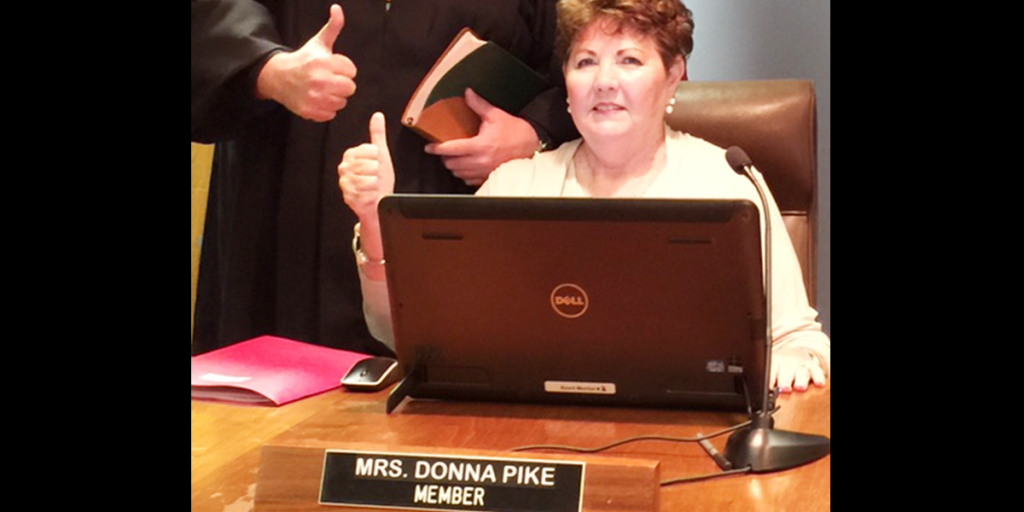
Irondale-Republican and Jefferson County School Board member Donna Pike is apologizing for social media post that some have deemed racist. On Tuesday, Pike found herself in the hot seat after being called out by local Birmingham activist Carlos Chaverst for a Facebook post she shared on June 1 with an picture of former President Barack Obama advisor Valerie Jarrett but with the caption “No! I’m not black! I’m Valerie Varret (sic) and I’m a Muslim, born in Iran!” Pike didn’t deny the post. “I shared it, and I’m not sorry I did, and I meant it because it shows hypocrisy in our country. Some people can get away with it and some people can’t. It was not racist,” Pike responded to Chaverst and the rest of the school board, according to AL.com. Pike also posted an image in support of Roseanne Barr, who’s revived sitcom was recently cancelled by ABC after the comedian posted a racist and Islamophobic tweet that attacked Jarrett. The post read, “Everybody seem to be against Roseanne. Do you still support her? If you still support her, share this picture and comment with yes.” Tuesday night, she deleted the posts and on Wednesday she apologized for them. “I didn’t realize they would be perceived as they are,” she told WVTM 13.
Election Day fun: BBQ, ballots and selfies galore
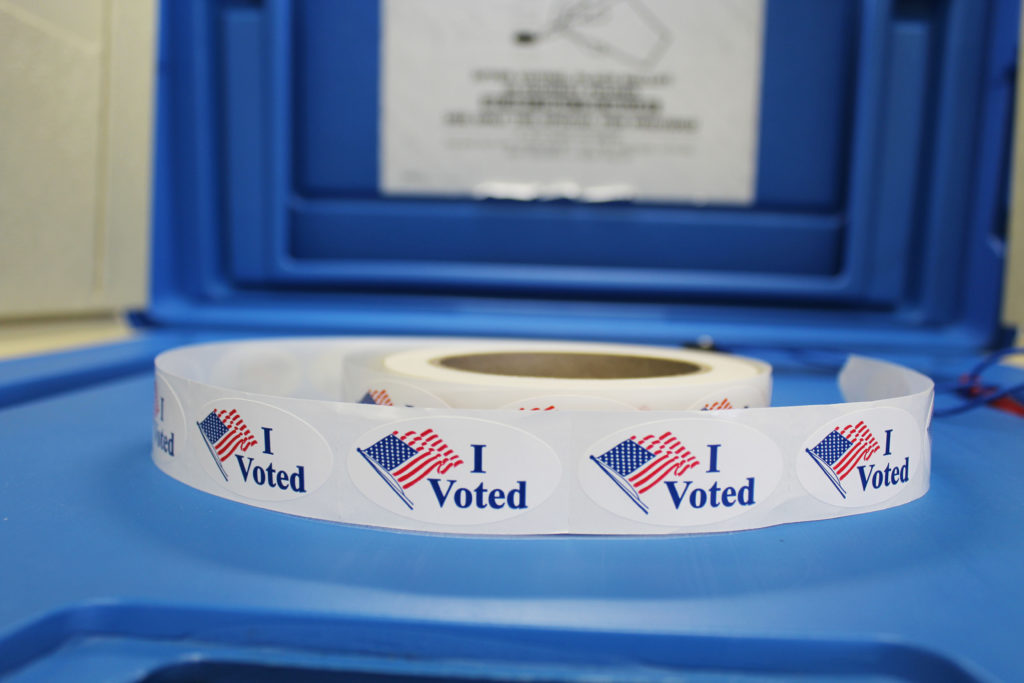
It’s Election Day in Alabama and the candidates are out and about across the state making their final efforts to sway and motivate voters to cast ballots in their direction. Many have taken to social media to keep their potential constituents up-to-date with their efforts. Here’s a look at what some of the candidates have been posting today (in no particular order): Mallory Hagan | Democratic candidate for Alabama’s 3rd U.S. Congressional District Terri Sewell | Democrat and Alabama’s 7th District U.S. Representative Mo Brooks | Republican and Alabama’s 5th District U.S. Representative Kay Ivey | Governor and Republican candidate for Governor Chris England | Democratic State Rep. District 70 You guys know I hate selfies but I know you see the sticker. I voted! Have you??? Let me the sticker! #alpolitics #ivoted #june5primary #yourvoteyourvoice #noexcuses A post shared by Christopher England (@repengland70) on Jun 5, 2018 at 9:12am PDT Joe Siegelman | Democratic candidate for Attorney General Voting felt a little different this time! Please get out to the polls and flex your franchise. They’re open until 7pm! 🇺🇸 A post shared by Joseph Siegelman (@joesiegelman) on Jun 5, 2018 at 6:06am PDT Walt Maddox | Democratic candidate for Governor Walt Maddox and family head to the polls in Tuscaloosa. #primaryelection #alpolitics #tuscaloosa @aldotcomnews A post shared by Ben Flanagan (@thisbenflanagan) on Jun 5, 2018 at 9:13am PDT Tommy Battle | Republican candidate for Governor Eula and I voted this morning. Have you gotten your ‘I Voted’ sticker yet? Get to your polling location before 7pm tonight! Every vote counts in this election—I hope to earn yours. 🚨🚨🚨#VoteToday #BattleforGovernor A post shared by Tommy Battle (@battleforgovernor) on Jun 5, 2018 at 10:28am PDT
Facebook may be facing an ‘era of accountability’

The problems keep piling up for Facebook, and it’s unclear how long the internet giant will be able to brush them aside as it barrels toward acquiring its next billion users. The world’s biggest social network has unwittingly allowed groups backed by the Russian government to target users with ads. That’s after it took months to acknowledge its outsized role in influencing the U.S. election by allowing the spread of fake news – though before news emerged that it let advertisers target messages to “Jew-haters.” Now Facebook is under siege, facing questions from lawmakers and others seeking to rein in its enormous power. The company has turned over information on the Russia-backed ads to federal authorities investigating Russian interference in the U.S. presidential election. Critics say the company also needs to tell its users how they might have been influenced by outside meddlers. Speculation is rife that Facebook executives, perhaps including CEO Mark Zuckerberg, could be called to testify before Congress. Hearings might lead to new regulations on the company. “Facebook appears to have been used as an accomplice in a foreign government’s effort to undermine democratic self-governance in the United States,” writes Trevor Potter, former chairman of the Federal Election Commission and now head of a nonpartisan election-law group, in a letter to Zuckerberg. “ERA OF ACCOUNTABILITY” Potter’s group, the Campaign Legal Center, wants Facebook to make the Russian-sponsored ads public. The company has so far declined to do so, citing the ongoing investigations. It has provided the ads and other information to Robert Mueller, the special counsel in charge of the Russia investigation, Facebook said in a statement, although it declined to elaborate. The company that nudges its users to reveal intimate details about their lives, it turns out, isn’t all that comfortable doing the same. That’s true for everything from the secret algorithms that recommend “people you might know” to data on its attempts to clamp down on the spread of false news shared across its network. The company justifies its secrecy in many ways, having variously claimed legal restrictions, business secrets, security and privacy protections to excuse its opacity. But Jonathan Albright, whose late 2016 research on the “fake news” propaganda ecosystem outlined how propaganda websites track and target users, thinks the current moment may be a turning point for online giants like Facebook. “Now that it has run directly into something that possibly affected the outcome of the election – but they can’t determine how – this may be their era of accountability,” said Albright, the director of research at the Tow Center for Digital Journalism at Columbia University. There has been no other company on the planet, Albright added, that can provide access to as many real people as Facebook. POWER GAMES AND NEW RULES Facebook prefers to think of itself as an online platform, but in many respects it’s also a modern sort of media company, if for no other reason than that so many people rely on it as a source of news and information. In its early years, Facebook even described itself as a “social utility.” Now the question is whether it should be regulated as one – and if so, how. There aren’t many straightforward answers, even where political ads already subject to government rules are concerned. It’s already illegal for foreign nationals to spend money in connection with a U.S. federal election, whether on or off of Facebook. And campaign law requires people who spend money on another person’s website to disclose that fact in the ad itself. Broadcast-era election law, however, can be a poor fit for the Internet Age. Attempts to sway political sentiment on Facebook can be targeted to small groups who share a common background or attitudes, making them difficult to track from the outside. And many such efforts might not resemble traditional advertisements at all. The goal of many Facebook marketing campaigns is to generate posts that regular people will spread widely for free; political persuasion campaigns can work the same way. “As a practical matter, it is extremely difficult for the U.S. government to regulate content on the internet that may have an effect on the U.S. election,” said Nathaniel Persily, a professor at Stanford Law School. “If a teenager in his mother’s basement in Moscow wants to put up a YouTube video, it’s not clear what the U.S. will be able to do about that.” Difficult doesn’t mean impossible. Persily, for instance, thinks that Facebook could use its AI technology to flag election-related ads that don’t bear the disclosures required by existing law. Companies like Facebook could also be required to do some kind of due diligence on who is spending money on their platforms on behalf of candidates, he added. Keeping an online repository of all candidate-related ads within six months of an election, identified by their backers, could also provide an additional check on illegal attempts to sway elections. Republished with permission from the Associated Press.
Alabama Supreme Court pauses officer’s murder trial over social media post

The Alabama Supreme Court has temporarily halted the murder trial of a Montgomery police officer to consider whether the judge should be removed because of a social media post in which he complained about being stopped by police because he is black. Justices on Friday ordered the pause to consider the defense request. Officer Aaron Smith faces murder charges in the 2016 shooting of 58-year-old Greg Gunn. The white officer stopped Gunn, who is black, as Gunn was walking late at night. Defense lawyers asked Montgomery County Circuit Judge Greg Griffin to step aside over a Facebook post. In the post, Griffin described being stopped by police who said he matched a suspect’s description. Justices asked for briefs to be filed quickly. The case is scheduled for trial in October. Republished with permission from the Associated Press.
Blake Dowling: How (and when) to do social in 2017

Social media accounts are rocking and rolling; you have lots of followers. But do you have a strategy for your messaging? Or are you barreling down the Twitter Highway, Eastbound and Down, Smokey and the Bandit-style or do you have a plan? As with all things, taking a strategic approach couldn’t hurt. For today’s purposes, I speak to professional posting. However, for some of us, it is a blurry line, where personal and professional seem to blend together; am I right? Writers, Bloggers, Business owners, Politicos, Hackers, Bowlers, etc. Sometimes our craft and personal interests are closely linked. So … A) This means we have chosen our career path very well and are yin-and-yang-ing through the cosmos all balanced and what not. Or … B) We are pathologically obsessed with our work and concurrently are mild egomaniacs that need to get a grasp on human existence. Or a balance of the two, perhaps? Pam Bondi and most politicians have it down, with personal and professional accounts for all things tweeting, but methinks that separation requires a team of staffers and assistants. Anyway, let’s look at some cool examples from a couple of guys named Steve. Steve Israel is a former congressman from New York (just retired) who manages to balance facts, humility, and randomness in perfect harmony. You should follow this down-to-earth chap. Steve Martin made “The Jerk.” He helped set up “Saturday Night Live.” It should come as no surprise that the 71-year-old Martin is a master at Twitter. Have you seen him play live with his bluegrass band? They rock. If the Russians can find my old iTunes playlist, that would be so great. — Steve Martin (@SteveMartinToGo) July 28, 2016 Back to the chart on Facebook posting. You want to maximize those SLCs (share, likes, comments) — take a look at windows of opportunity and get to branding, or sharing pictures of your cat (Mr. Snickers) going to war with a couch. Whatever floats your boat. It appears Thursday and Friday (afternoons) are the money days for post effectiveness; on the other hand, Mondays and Tuesdays are the no-go zones. Back to Twitter, the below chart is wise. I can’t tell you how many times during basketball season when I “DVR-ed” (now a word) a game only to glance at Twitter and have my self-imposed media blackout destroyed in a nanosecond. I follow way too many sports “experts.” Studies show that noon-1 p.m. are the most popular times to tweet; those same studies show that during those times, 3 out of 4 people are more likely to glance at Twitter. So, you may have a tougher chance of your message getting through the masses around lunch. That said, utilize the 3-4 p.m. window for your messaging. That’s about it, as you run amok through the social media world, don’t forget to think strategically, keep it lively, use hashtags, keep content fresh, don’t be a cyberbully and — most importantly — have fun. See you out there in Insta-Face-Twitter land. ___ Blake Dowling is CEO of Aegis Business Technologies and he loves gladiator movies. He can be reached at dowlingb@aegisbiztech.com.
Politicians blocking people on social media ignites debate

An emerging debate about whether elected officials violate people’s free speech rights by blocking them on social media is spreading across the U.S. as groups sue or warn politicians to stop the practice. The American Civil Liberties Union this week sued Maine Gov. Paul LePage and sent warning letters to Utah’s congressional delegation. It followed recent lawsuits against the governors of Maryland and Kentucky and President Donald Trump. Trump’s frequent and often unorthodox use of Twitter and allegations he blocks people with dissenting views has raised questions about what elected officials can and cannot do on their official social media pages. Politicians at all levels increasingly embrace social media to discuss government business, sometimes at the expense of traditional town halls or in-person meetings. “People turn to social media because they see their elected officials as being available there and they’re hungry for opportunities to express their opinions and share feedback,” said Anna Thomas, spokeswoman for the ACLU of Utah. “That includes people who disagree with public officials.” Most of the officials targeted so far – all Republicans – say they are not violating free speech but policing social media pages to get rid of people who post hateful, violent, obscene or abusive messages. A spokeswoman for Maryland Gov. Larry Hogan called the Aug. 1 lawsuit against him “frivolous” and said his office has a clear policy and will “remove all hateful and violent content” and “coordinated spam attacks.” The ACLU accused Kentucky Gov. Matt Bevin of blocking more than 600 people on Facebook and Twitter. His office said he blocks people who post “obscene and abusive language or images, or repeated off-topic comments and spam.” Spokesmen for Utah Sen. Orrin Hatch and Rep. Mia Love, who were singled out by the ACLU, said people are rarely blocked and only after they have violated rules posted on their Facebook pages to prevent profanity, vulgarity, personal insults or obscene comments. “We are under no obligation to allow Senator Hatch’s Facebook page to be used as a platform for offensive content or misinformation,” spokesman Matt Whitlock said. Katie Fallow, senior staff attorney at Columbia University’s Knight First Amendment Institute, which sued Trump last month, said there’s no coordinated national effort to target Republicans. The goal is to establish that all elected officials – no matter the party – must stop blocking people on social media. “If it’s mainly used to speak to and hear from constituents, that’s a public forum and you can’t pick and choose who you hear from,” Fallow said. Rob Anderson, chairman of Utah’s Republican Party, scoffed at the notion that politicians are violating free-speech rights by weeding out people who post abusive content. “You own your Facebook page and if you want to block somebody or hide somebody, that’s up to you,” Anderson said. “Why else is there a tab that says hide or block?” Court decisions about how elected officials can and cannot use their accounts are still lacking in this new legal battleground, but rules for public forums side with free-speech advocates, said Erwin Chemerinsky, dean of the University of California-Berkeley Law School. For instance, lower court rulings say the government can’t deny credentials to journalists because their reporting is critical, he said. “These are government officials communicating about government business. They can’t pick or choose based on who they like or who likes them,” Chemerinsky said. But public officials may be able to legally defend the way they police their social media pages if they prove their decisions are applied evenly. “It’s got to content-neutral,” Chemerinsky said. Trump’s use of social media and the Supreme Court’s decision in June striking down a North Carolina law that barred convicted sex offenders from social media is driving the increased attention to the issue, said Amanda Shanor, a fellow at the Information Society Project at Yale Law School. “More and more of our political discussion is happening online,” Shanor said. “It’s more important that we know what these rules are.” Republished with permission of The Associated Press.
President Donald Trump says he won’t stay off social media
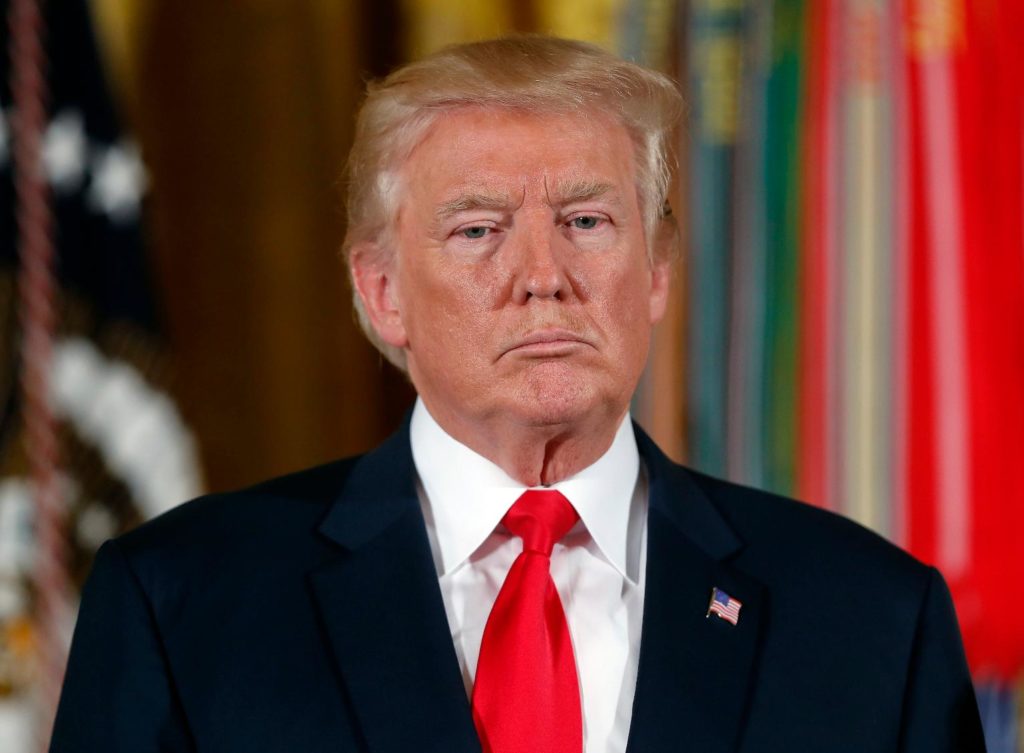
President Donald Trump may be trying for a reset in the West Wing, but he is making clear that he is not changing his Twitter habit. On Twitter Tuesday, Trump said: “Only the Fake News Media and Trump enemies want me to stop using Social Media (110 million people). Only way for me to get the truth out!” The tweet came one day after retired Gen. John Kelly took over as Trump’s new chief of staff. Tapped to bring order to the chaotic West Wing, Kelly quickly made his presence known Monday — ousting newly appointed communications director Anthony Scaramucci and revising the command structure so that all senior staffers report to him. Those moves were praised Monday by Trump allies and lawmakers, who expressed hope that Kelly would help stem internal conflicts and advance a policy agenda after six months of tumult. But less clear is how much control Kelly will have over Trump’s predilection for sowing conflict and making off-the-cuff comments on social media. White House spokeswoman Sarah Huckabee Sanders repeated Tuesday that Kelly had full control over the staff. Asked at a press briefing if senior advisers Ivanka Trump, Jared Kushner and others would be able to drop in to see the president, she said: “I don’t think anyone just wanders into the Oval Office.” Sanders added that “Gen. Kelly is going to work with the entire team as he has been doing over the last couple of days.” Sen. Lindsey Graham, speaking on NBC’s “Today Show,” said he was encouraged by Kelly’s new role, but stressed that he was looking for “discipline” from Trump in order to move forward with issues like health care and tax reform. “He has an obligation to be president for all of us and stop the chaos. Most of the chaos is generated by him and no one else,” Graham said. Republished with permission of The Associated Press.


